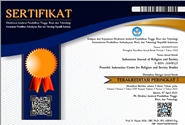Assessing Justice: Exploring the Role of Values in Defining Fairness
Abstract
Keywords
Full Text:
PDFReferences
Banks, M. (2017). Creative justice: Cultural industries, work, and inequality. New York: Rowman & Littlefield International, Ltd.
Blader, S. L., & Chen, Y. R. (2012). Differentiating the effects of status and power: A justice perspective. Journal of Personality and Social Psychology, 102(5), 994–1014. doi:https://doi.org/10.1037/a0026651.
Bye, H. H., & Sandal, G. M. (2016). Applicant personality and procedural justice perceptions of group selection interviews. Journal of Bussiness and Psychology, 31, 569–582. doi:10.1007/s10869-015-9430-9.
Chan, S. H., & Lai, H. Y. (2017). Understanding the link between communication satisfaction, perceived justice and organizational citizenship behavior. Journal of Business Research, 70, 214-223. doi:https://doi.org/10.1016/j.jbusres.2016.08.017
Cheng, K. K.-y. (2017). Prosecutorial procedural justice and public legitimacy in hong kong. The British Journal of Criminology, 57(1), 94-111. doi:https://doi.org/10.1093/bjc/azv106.
Chin, M. K., Hambrick, D. C., & Treviño, L. K. (2013). Political ideologies of CEOs: The influence of executives’ values on vorporate social responsibility. Administrative Science Quarterly, 58(2), 174-184. doi:https://doi.org/10.1177/000183921348698.
Colquitt, J. A. (2012). Organizational justice. In S. W. Kozlowski, The Oxford handbook of organizational psychology (pp. 526–547). Oxford University Press.
Colquitt, J. A., Greenberg, J., & Zapata-Phelan, C. P. (2005). What Is organizational justice? A historical overview. New York: Psychology Press.
Dammer, H. R., & Albanese, J. S. (2014). Comparative criminal justice systems. USA: Wadsworth.
Faturochman. (2002). Keadilan perspektif psikologi. Yogyakarta: Pustaka Pelajar Offset.
Fidel, L. S., & Tabchnick, B. J. (2001). Using multivariate statistics. Boston: Allyn & Bacon.
Ganster, D. C., & Rosen, C. C. (2013). Work stress and employee health: A multidisciplinary review. Journal of Management, 39(5), 367-377. doi:https://doi.org/10.1177/0149206313475815.
Gau, J. M. (2014). Procedural justice and police legitimacy: A test of measurement and structure. American Journal of Criminal Justice, 39, 187–205. doi:https://doi.org/10.1007/s12103-013-9220-8.
Greenberg, J., & Colquitt, J. A. (2005). Handbook of organizational justice. New York: Psychology Press.
Greenberg, J., & Colquitt, J. A. (2005). Handbook of organizational justice. New York: Psychology Press.
Hailes, H. P., Ceccolini, C. J., E. Gutowski, E., & Liang, B. (2021). Ethical guidelines for social justice in psychology. Professional Psychology: Research and Practice, 52(1), 1-11. doi:https://doi.org/10.1037/pro0000291.
He, H., Zhu, W., & Zheng, X. (2014). Procedural justice and employee engagement: roles of organizational identification and moral identity centrality. Journal of Business Ethics, 122, 681–695. doi:https://doi.org/10.1007/s10551-013-1774-3.
Jun, H. (2018). Social justice, multicultural counseling, and practice. New York: Springer.
Lee, F. L., Yuen, S., Tang, G., & Cheng, E. W. (2019). Hong kong’s summer of uprising. The China Review, 19(4), 1-32. doi:https://www.jstor.org/stable/26838911.
Lefkowitz, J. (2017). Ethics and values in industrial-organizational psychology. New York: Routledge.
Leifels, K., & Bowen, P. (2021). The dark side of teamwork–the relationship between social stressors, social resources and team member well-being in monocultural and multicultural work teams. Cross Cultural & Strategic Management, 28(4), 173-183.
Ohana, M. (2014). A multilevel study of the relationship between organizational justice and affective commitment: The moderating role of organizational size and tenure. Personnel Review, 43(5), 654-671. doi: https://doi.org/10.1108/PR-05-2013-0073.
Osgood, J. M. (2017). Is revenge about retributive justice, deterring harm, or both? Social and Personality Psychology Compass, 11(1), 115-125. doi: https://doi.org/10.1111/spc3.12296.
Pang, W., & Zhang, Q. (2018). Withholding knowledge in teams: An interactionist perspective of personality, justice, and autonomy. Social Behavior and Personality, 46(12), 2009-2024. doi: https://doi.org/10.2224/sbp.7390.
Rochon, T. R. (1988). Mobilizing for peace: The antinuclear movements in western europe. New Jersey: Princeton University Press.
Rosenthal, L. (2016). Incorporating intersectionality into psychology: An opportunity to promote social justice and equity. American Psychologist, 71(6), 474–485. doi:https://doi.org/10.1037/a0040323.
Rupp, D. E., Shao, R., Thornton, M. A., & Skarlicki, D. P. (2013). Applicants' and employees' reactions to corporate social responsibility: The moderating effects of first-party justice perceptions and moral identity. Personnel Psychology, 66(4), 895-933. doi:https://doi.org/10.1111/peps.12030.
Sampson, E. E. (1983). Justice and the critique of pure psychology. New York: Plenum Press.
Schneider, B., González-Romá, V., C. Ostroff, C., & West, M. A. (2017). Organizational climate and culture: Reflections on the history of the constructs in the Journal of Applied Psychology. Journal of Applied Psychology, 102(3), 468–482. doi:https://doi.org/10.1037/apl0000090.
Schulte-Braucks, J., Baethge, A., Dormann, C., & Vahle-Hinz, T. (2019). Get even and feel good? Moderating effects of justice sensitivity and counterproductive work behavior on the relationship between illegitimate tasks and self-esteem. Journal of Occupational Health Psychology, 24(2), 241–255. doi:https://doi.org/10.1037/ocp0000112.
Schulze, J., Winter, L. A., Woods, K., & Tyldesley, K. (2017). Investigating the significance of social justice in educational psychology practice-A systematic literature review. Educational and Child Psychology, 34(3), 57–73.
Schwartz, S. H. (1997). Values and culture. New York: Routledge.
Shao, R., Rupp, D. E., & Jones, K. S. (2011). Employee justice across cultures: A meta-analytic review. Journal of Management, 39(1), 246-256. doi:https://doi.org/10.1177/0149206311422447.
Shao, R., Rupp, D. E., & Jones, K. S. (2013). Employee justice across cultures: A meta-analytic review. Journal of Management, 39(1), 263–301. doi:https://doi.org/10.1177/0149206311422447.
Skrentny, J. D. (1996). The ironies of affirmative action: Politics, culture, and justice in america. London: The University of Chicago Press, Ltd.
Strom, D. L., Sears, K. L., & Kelly, K. M. (2014). Work Engagement: The Roles of organizational justice and leadership style in predicting engagement among employees. Journal of Leadership & Organizational Studies, 21(1), 71–82. doi:https://doi.org/10.1177/1548051813485437.
Thrift, E., & Sugarman, J. (2019). What is social justice? Implications for psychology. Journal of Theoretical and Philosophical Psychology, 39(1), 1-17. doi: https://doi.org/10.1037/teo0000097.
Tyler, T. R., & Smith, H. J. (1999). Justice, social identity, and group processes. New York: Psychology Press.
Tyler, T. R., Boeckmann, R. J., Smith, H. J., & Huo, Y. J. (1997). Social justice in a diverse society. New York: Routledge.
Tyler, T. R., Goff, P. A., & MacCoun, R. J. (2015). The impact of psychological science on policing in the united states: procedural justice, legitimacy, and effective law enforcement. Psychological Science in the Public Interest, 16(3), 158-168. doi:https://doi.org/10.1177/1529100615617791.
Vasquez, M. J. (2012). Psychology and social justice: Why we do what we do. American Psychologist, 67(5), 337–346. doi:https://doi.org/10.1037/a0029232
Whitman, D. S., Caleo, S., Carpenter, N. C., Horner, M. T., & Bernerth, J. B. (2012). Fairness at the collective level: A meta-analytic examination of the consequences and boundary conditions of organizational justice climate. Journal of Applied Psychology, 97(4), 776–791. doi:https://doi.org/10.1037/a0028021.
Whitman, D. S., S. Caleo, S., Carpenter, N. C., Horner, M. T., & Bernerth, J. B. (2012). Fairness at the collective level: A meta-analytic examination of the consequences and boundary conditions of organizational justice climate. Journal of Applied Psychology, 97(4), 776–791. doi:https://doi.org/10.1037/a0028021.
DOI: https://doi.org/10.36256/ijrs.v4i2.330
Refbacks
- There are currently no refbacks.
Copyright (c) 2022 Indonesian Journal of Religion and Society

This work is licensed under a Creative Commons Attribution-NonCommercial 4.0 International License.
Indonesian Journal of Religion and Society (IJRS) Is Indexed By:

Indonesian Journal of Religion and Society (IJRS) is distribute under Creative Commons Attribution-NonCommercial 4.0 International License.













